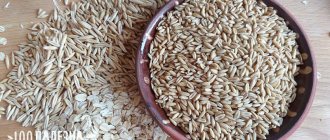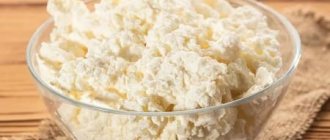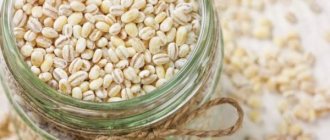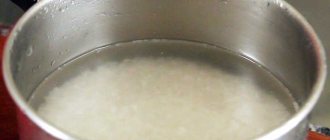What are raw oats?
Oats are a widely consumed whole grain.
Since your body cannot digest the kernels, they must be processed as follows ():
- Separation of husks from oatmeal
- Heat and wet treatment
- Flattening or shredding
The end products are oat bran, oat flour or rolled oats (rolled oats).
Oatmeal is a very popular breakfast item and can be eaten either cooked or raw.
This means you can cook them, such as when making oatmeal or soup, or enjoy them cold, such as adding raw oatmeal to smoothies.
However, due to the heating process that all oat kernels undergo to make them easily digestible and digestible, raw oats are technically cooked.
Summary:
Raw oats are rolled oats that have been heated during processing but not cooked for use in recipes such as oatmeal.
Uses of oatmeal
The described cereal is used not only in cooking. It is widely used for cosmetic purposes. It was also adopted by folk healers. Oatmeal is one of the components of many folk recipes used to eliminate or prevent various health problems. In traditional medicine, it is recommended in the diet for people during the postoperative period and for diseases of the digestive tract.
Did you know? In Scotland, every year they hold a championship where chefs compete in preparing porridge in the traditional way. It's called the Golden Cashmere.
In cosmetology
The active substances present in oats can have a number of beneficial effects on the skin. They exfoliate dead cells, renew, nourish, soften them, give them elasticity and smoothness. It has been proven that the product can accelerate wound healing, prevent the appearance of wrinkles, and retain moisture. Oats are included in many scrubs, soaps, shampoos, tonics, milks, and creams designed to rejuvenate and slow down the aging process. It is used in decorative and medicinal cosmetics.
It is recommended to use oatmeal and flakes when carrying out cosmetic procedures at home. These products are included in cleansing, anti-inflammatory, moisturizing, refreshing and nourishing masks and scrubs. They are also used to get rid of oily shine and acne.
Oatmeal is recommended for daily washes . This procedure is suitable for various skins, including problematic ones. In addition to the face, the product in question is also used to care for hands and nail plates. It is added during the preparation of baths, nourishing and moisturizing masks.
Oatmeal is rich in nutrients
Although oats are best known for the fiber and plant protein they contain, they also contain other nutrients ().
An 80-gram serving of raw oats contains ():
- Calories : 307 kcal
- Carbohydrates : 55 grams
- Fiber : 8 grams
- Protein : 11 grams
- Fat : 5 grams
- Magnesium : 27% of recommended daily intake (RDI)
- Selenium : 43% of RDI
- Phosphorus : 27% of RDI
- Potassium : 6% of RDI
- Zinc : 27% of RDI
In addition to being rich in nutrients such as magnesium, selenium and phosphorus, oats contain soluble fiber, a type of healthy dietary fiber that forms a gel-like substance when digested ().
The main type of soluble fiber in oats is beta-glucan, which is responsible for most of the beneficial properties of this cereal ().
Oats are also rich in highly digestible plant protein and provide more of this nutrient than many other grains.
In fact, the protein structures in oats are similar to those of legumes, which are considered to have high nutritional value ().
Summary:
Oats contain higher amounts of soluble fiber and high-quality protein than other grains, as well as many vitamins and minerals.
Dry oatmeal for weight loss
On the Internet you can find articles and video recommendations on consuming dry oatmeal to curb your appetite. Most information sources describe this process as follows.
- Eat 2 tablespoons of dry oatmeal on an empty stomach.
- We wash it down with water.
- The mixture will swell in the stomach and a feeling of fullness will appear.
Polza-vred.su
Oatmeal will be digested and provide the body with energy and beneficial nutrients for a long time. Beta-glucans contained in oatmeal increase the viscosity of the nutritional mass and slow down gastric emptying. The slow absorption of carbohydrates is especially beneficial for diabetics.
Health Benefits of Oats
Because oats contain many health-promoting compounds, they provide multiple health benefits (, ,).
May Help Lower Cholesterol Levels
Oats are rich in soluble fiber beta-glucan, which has been shown in several studies to lower cholesterol (, , , , ).
Beta-glucan works by forming a gel in the small intestine. This gel limits the absorption of dietary cholesterol and prevents the reabsorption of bile salts, which play an essential role in fat metabolism (,).
Research has shown that daily doses of at least 3 grams of oat beta-glucan can reduce blood cholesterol levels by 5–10% ().
What's more, a test-tube study found that raw oats release about 26% of their beta-glucan during digestion, compared to only 9% for cooked oats. Thus, raw oatmeal may have a greater effect on fat metabolism and cholesterol levels ().
May help control blood sugar
Controlling your blood sugar levels is vital to health and is especially important for people with type 2 diabetes or those who have difficulty producing or responding to insulin, the hormone that regulates blood sugar levels.
Beta-glucan has been shown to help control blood sugar levels due to its ability to form a gel-like substance in your digestive system.
Viscosity slows the rate at which your stomach emptys its contents and digests carbohydrates, which is associated with lower post-meal blood sugar levels and stabilized insulin production (, ).
A review of 10 studies of people with type 2 diabetes found that daily consumption of foods containing at least 4 grams of beta-glucan per 30 grams of carbohydrates for 12 weeks reduced blood sugar levels by 46% compared with the control group. (, ).
May Benefit Heart Health
High blood pressure is a risk factor for cardiovascular disease, and is one of the most common conditions and a leading cause of death worldwide (, ).
Soluble fiber, such as beta-glucans in oats, has been linked to blood pressure-lowering effects ().
One 12-week study of 110 people with untreated high blood pressure found that consuming 8 grams of soluble fiber from oats per day reduced both systolic and diastolic blood pressure (top and bottom values), compared with the control group ().
Similarly, a 6-week study of 18 people with high blood pressure found that those who consumed 5.5 grams of beta-glucan per day experienced a 7.5 and 5.5 reduction in systolic and diastolic blood pressure. mmHg, respectively, compared to the control group ().
Moreover, in a 4-week study of 88 people taking medications for high blood pressure, it was found that 73% of those who consumed 3.25 grams of soluble fiber from oats per day could either stop or reduce their intake. medications compared to 42% of participants in the control group ().
Promotes your gut health
Eating oatmeal can also support gut health by increasing fecal volume ().
This effect is due to the insoluble fiber contained in oats, which, unlike soluble fiber, does not dissolve in water and therefore does not form a gel-like substance.
The bacteria in your gut don't ferment insoluble fiber as much as they ferment soluble fiber, which increases the bulk of your stool.
It is estimated that oats increase stool weight by 3.4 grams per gram of fiber consumed ().
Research has also shown that consuming oat fiber daily may be a beneficial and inexpensive treatment for constipation, which affects about 20% of the general population ().
One study of people with constipation found that 59% of participants who consumed oat bran fiber were able to stop taking laxatives ().
Raw oats naturally contain oat bran, although you can also buy it separately.
May promote weight loss
Higher consumption of whole grain cereals, such as oats, is associated with a lower risk of weight gain and obesity ().
In part, this may be because soluble fiber can help you feel full longer ().
Increased feelings of fullness are associated with decreased food intake as it helps suppress appetite (, ,).
Two studies found that eating oats increased feelings of fullness and suppressed the desire to eat for four hours compared to ready-to-eat breakfast cereals. These effects have been attributed to the beta-glucan found in oats (,).
Thus, raw oats can help you maintain weight or lose weight.
Summary:
Raw oats are rich in beta-glucan, a soluble fiber that can lower blood sugar, blood pressure and cholesterol. Eating raw oats can also relieve constipation and promote weight loss.
Variety of dry oatmeal
Despite the wide range of oat flakes on supermarket shelves, the products are divided into three main types.
- Grainy or whole grain flakes are produced by pressing oat grains. This product swells slowly when soaked and takes a long time to cook. If you chew a small amount of these flakes in dry form, you can stop your stomach. This is especially true for people with sensitive digestion.
- Tender flakes are also produced using pressing technology, but finely chopped grain is used. These crackers swell faster and boil within a few minutes. If you experiment with eating dry oatmeal, it is better to use this type of product, despite the fact that its nutritional value is lower than that of grainy flakes.
- Instant flakes are made from finely ground oatmeal. They turn into a liquid substance once you mix them with water or milk. The flakes are used to prepare infant formula and liquid porridge for tube feeding. The product is high in calories because it is designed to increase muscle mass. Frequent use without physical activity can lead to weight gain.
Whole oatmeal contains healthy fiber. Non-digestible fiber improves intestinal motility. But if they are abused, the breakdown products will not have time to be eliminated from the body, will begin to accumulate in the intestines and lead to blockage.
Along with this, phytic acid contained in oat grains slows down the absorption of calcium. This leads not only to problems with bones and joints, but also to heart rhythm disturbances.
Possible harm of raw oats
Although raw oats are safe to eat, to avoid unwanted side effects, it is recommended to pre-soak them in water, juice, milk or a non-dairy alternative.
Eating dry, raw oats can cause them to accumulate in the stomach or intestines, leading to indigestion or constipation.
Additionally, raw oats contain an anti-nutrient called phytic acid, which binds to minerals such as iron and zinc, making them difficult for the body to absorb. This can lead to mineral deficiencies over time, but this is usually not a problem if you eat an overall balanced diet.
Additionally, soaking raw oats in water reduces the effect of phytic acid on mineral absorption. For maximum benefits, soak the oats for at least 12 hours (, ,).
Summary:
The phytic acid in raw oats interferes with mineral absorption. Soaking raw oats reduces phytic acid levels. It also helps your body digest it and helps prevent constipation.
How often can you eat oatmeal without harming your body?
Oatmeal affects the body in different ways. It all depends on the time of day when this product is consumed, and what technology is used to prepare it.
Harm and benefits of oatmeal depending on the time of meal (table):
| Eating | Benefit | Harm |
| For breakfast | Oatmeal cooked with milk is healthy. This component increases nutritional value; it is also important to include eggs, cottage cheese, and kefir in the menu. | A product cooked in water is not able to meet the body's needs for animal protein. And this leads to poor cell regeneration, slow metabolism and synthesis of enzymes and protein hormones. |
| For lunch | A bowl of oatmeal can replace a full lunch. Due to the low glycemic index, the product is slowly absorbed by the body, so a person remains full for a long time. | During lunch hours, you can safely eat oatmeal, regardless of what it is prepared with - water or dairy products. The croup will not cause any harm. |
| For dinner | Soaked flakes are allowed. You should eat oatmeal for dinner no later than three hours before bedtime. Nutrients in the porridge normalize sleep, relieve stress, and improve intestinal function. | Any grain contains a large amount of carbohydrates; nutritionists recommend reducing their consumption towards the end of the day. |
| Looking at night (before bedtime) | It is useful to drink oatmeal broth at night, as it cleanses the body. The presence of vitamin B, which has a positive effect on the production of serotonin and melatonin, improves sleep and reduces nervous feelings. | Porridge (especially with milk) does not have time to be processed, and this causes a feeling of heaviness in the stomach. In addition, nutritionists do not recommend eating oatmeal at night, as this risks weight gain. |
Nutritionists believe that it is safe to consume oatmeal two to three times a week in the morning.
Porridge on the water
Oatmeal cooked in water is often included in the diet. This porridge is also preferred by adherents of proper nutrition. You need to prepare the dish in accordance with certain rules; this is the only way to preserve the benefits of the product:
- It is better to cook oatmeal in water, without adding dairy products, including butter or margarine;
- granulated sugar and other sweeteners are not used, they increase calorie content and complicate the digestive process; You can’t salt the cereal.
Nutritionists have proven that brewed cereals (pour boiling water or hot milk and let stand) are more beneficial than boiled ones. Thus, more nutrients are retained in the porridge. However, frequent consumption of such a product can lead to the accumulation of phytic acid and calcium deficiency in the body.
How to Include Raw Oats in Your Diet
Raw oats are an incredibly versatile ingredient.
You can add it to your favorite yogurt or smoothie.
One easy and nutritious way to enjoy raw oats is to soak the oats overnight in water or milk.
This allows them to absorb liquid, making them easily digestible in the morning.
To soak oats overnight you will need:
- 80 grams of raw oats
- 1 cup (240 ml) water, yogurt or milk
- 1 teaspoon chia seeds
- 1 teaspoon sweetener such as honey, maple syrup, sugar, or sugar substitute
- 1/2 cup fresh fruit, such as banana or apple slices
Combine all ingredients in a container with a lid to prevent the oats from drying out and refrigerate overnight.
If you want, you can add more fresh fruit along with nuts or seeds in the morning.
Summary:
Raw oatmeal can be eaten in a variety of ways. However, be sure to give the oats some time to hydrate before consuming to improve absorption.
Steaming method
Steamed oatmeal, which is prepared from polished oatmeal, is also considered a quick breakfast. It is worth using (not instant) rolled oats.
Ingredients
- Hercules flakes (whole) – 4 tbsp. l.;
- boiling water – 12 tbsp. l.;
- dried fruits - several pieces of prunes, dried apricots, raisins;
- sugar or honey
Cooking method
- Pour oat ingredient overnight. Place washed oatmeal, cleared of debris, into a separate dish with high sides. Drain the water.
- Add finely chopped dried fruits.
- Pour boiling water over it. To cover with a lid.
- The steamed flakes must stand for at least 20 minutes under the “fur coat” so that they steam well.
- Add honey or syrup to the finished dish if desired.
As it turns out, being lazy can also be beneficial, especially when it comes to preparing a product that is valuable to the body.
Summarize
- Raw oats are rich in nutrients and safe to eat.
- Because it contains high levels of soluble fiber beta-glucan, it may help promote weight loss and improve blood sugar, cholesterol, and heart and gut health.
- Raw oatmeal is also easy to include in your diet. Just be sure to soak the oats first to improve nutrient absorption.
The article was prepared by experts for informational purposes only. It should not be used as a guide for treating medical conditions and is not a substitute for professional medical advice, diagnosis, or treatment. In case of illness or any symptoms, you should always consult a doctor and not self-medicate.
Tags: oats
About the author: Alexander Fedorov
Candidate of Biological Sciences, biologist, nutrition expert. Graduated from Stavropol State University with a degree in Biology at the Faculty of Biology and Chemistry.
- Related Posts
- Corn flour: benefits and harms
- Wheat bran: benefits and harms, how to take
- What are the benefits of wheat? Benefits and harm to the body
« Previous entry










